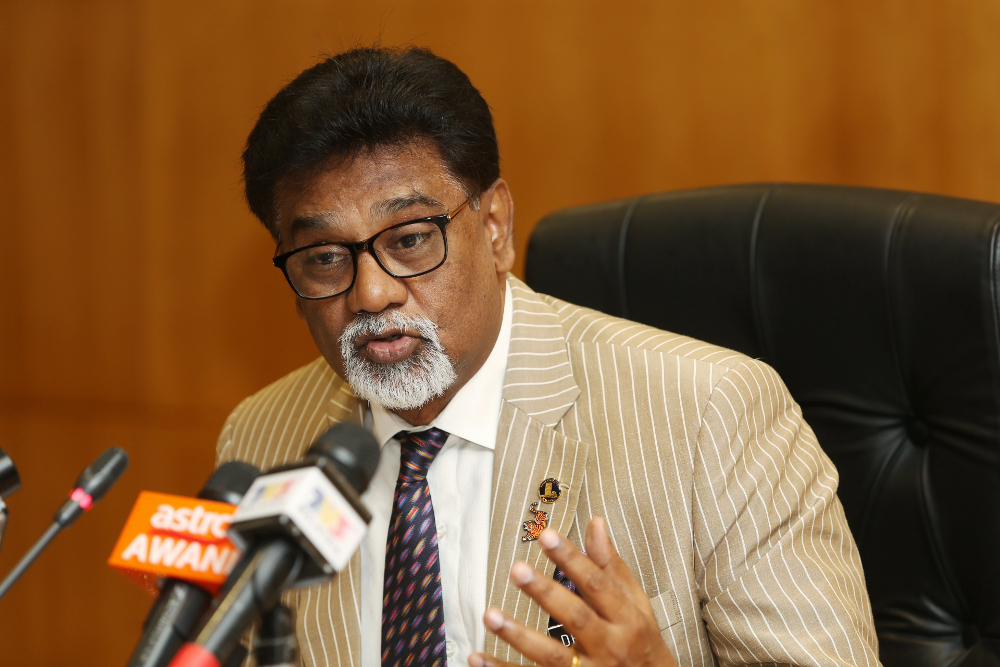KUALA LUMPUR, June 1 — Environmentalists are concerned Dr Xavier Jayakumar’s recent announcement that the government is thinking of tapping underground water resources will impact the environment negatively.
The water, land and natural resources minister spoke about plans to embark on digital mapping to identify underground water resources nationwide.
Environmental activists raised the alarm about possible landslides and sinkholes as a consequence of tapping underground water.
“The side effects in the long term are really, really bad. Number one, it will create insufficient drinking water because of too much water being drained.
“Next, the moisture of the soil...because once you keep digging water from underground, the soil will not be moist anymore. So what happens when the soil is not moist? It will lose its fertility. So once the soil is not fertile, the plants will die,” Association for the Protection of the Natural Heritage of Malaysia president Puan Sri Shariffa Sabrina Syed Akil told Malay Mail.
She said that the area from which the water is tapped will turn into a desert in the long run, and can collapse as the water level has been disrupted.
Sabrina proposed that the government first amend the Forestry Act to ban logging altogether, to conserve forests and ensure water supply, instead of digging for underground water.
“The problem with our government now is the state governments are mostly greedy, because logging means money.
“Now I’m shocked that our minister, instead of going through and changing the Forestry Act to ban logging, goes for this kind of water digging instead,” she added.
The Malaysian Nature Society also echoed similar concerns, raising issues about the quality of underground water.
Its president Prof Ahmad Ismail pointed out the need to conduct a thorough study on the viability of underground water first.
He also questioned the need to suddenly focus on extracting underground water for consumption.
“The idea of tapping underground water is not new, but there are no detailed studies. How critical do we need underground water now? Where are the critical areas and why are they critical?
“We don’t calculate how much water we can get from our current water resources. How much we need, how much we use and how much we waste? Do we have enough water catchment areas?” he said, adding that these questions must be answered first before exploring the idea of tapping underground water.
Like Sabrina, Ahmad also cautioned against parties who would now scheme for opportunities to carry out more logging activities using Dr Xavier’s idea as a basis.
“When we depend on water catchment areas where the forests are, they will certainly keep the forests.
“But when we depend on underground water, they might confuse the public by saying since it’s underground water that is being extracted, it will not affect the surface water, and there will be more chances to cut more forest.
“We don’t want them using that as a reason to cut more forests.
“We need to monitor underground water too. Is it clean or polluted?” he said, pointing out that if the existing soil is contaminated with chemicals such as pesticides, the underground water would also contain the toxic elements.
Malaysia Green and Blue Environmental Protection Society’s secretary Jaron Keng also shared the activists sentiment on tapping underground water, warning of contamination.
Keng said that while groundwater extraction for human consumption is common in countries with arid land and less rainfall like Australia, there are inherent negative effects linked to the practise.
“Yes, there are some negative effects of groundwater extraction such as lowering the ground water table, deterioration of groundwater quality, reduction of water in streams and lakes and land subsidence.
“Groundwater pumping can alter how water moves between an aquifer and a stream, lake, or wetland by either intercepting groundwater flow that discharges into the surface-water body under natural conditions,” he told Malay Mail.
Keng said that excessive pumping can also lower the groundwater table and cause wells to no longer be able to reach groundwater, adding that when the resource is overused, lakes, streams, and rivers connected to groundwater risk having its supply diminished too.
“Groundwater is susceptible to pollutants. Groundwater contamination occurs when man-made products such as gasoline, oil, road salts and chemicals get into the groundwater and cause it to become unsafe and unfit for human use.
“Land subsidence occurs when there is a loss of support below ground.
“Therefore, instead of venture in groundwater extraction, I think conservation of current river water which is in abundance, is a more viable option,” he added.
Environmental Management and Research Association president KN Gobinathan expressed surprise with Dr Xavier’s proposal, adding that the tapping of underground water is not a good practice.
He said that mining technologies may be good but the after-effects of such water mining activities may prove otherwise.
“I was surprised by his statement. Depending on the locality, generally it is not good practice to mine underground water. Upsetting to the natural ecosystem. A good mapping is required, which is what we do not have.
“Mining technology I am certain will be good, but you can’t be certain about the effects of altering natural ecosystems with flooding, loss of minerals, river water levels and others,” he said.
“Underground water mining really requires in-depth study of rainfall patterns, to determine the environmental risk,” he said.



















